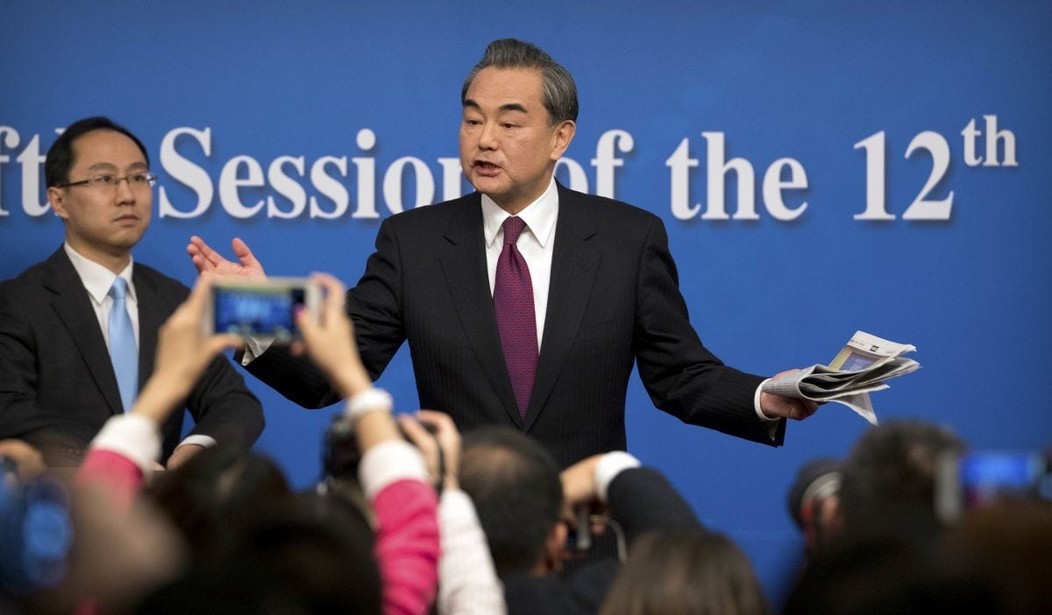Chinese Foreign Minister Wang Yi said at a press conference on Wednesday that North Korea and the United States were like “two accelerating trains coming toward each other with neither side willing to give way.” Wang Yi was alluding to a series of recent events that have caused tensions in the Far East to ratchet up to levels not seen in decades.
Foreign Minister Wang Yi’s warning came after a cascade of events that has sent regional tensions soaring, including provocative North Korean missile tests and annual US-South Korean wargames that infuriate Pyongyang.
Beijing itself is particularly concerned over an American missile-defence system being rolled out in South Korea as a shield against the North Korean threat, but which Wang said also “undermines China’s strategic security.”
He called on North Korea to suspend its nuclear and missile activities in exchange for the US and South Korea halting the military exercises.
“The two sides are like two accelerating trains coming toward each other with neither side willing to give way,” Wang said at a press conference on the sidelines of China’s annual parliament session.
“The question is: are the two sides really ready for a head-on collision? Our priority now is to flash the red light and apply the brakes on both trains.”
Pyongyang blasted at least four missiles toward Japan on Monday, three of which splashed down in waters within Japan’s Exclusive Economic Zone, saying they were tests for a possible strike on US bases in Japan.
Wang said China’s proposal could help bring the US and North Korea back to negotiations on ending Pyongyang’s weapons programmes.
But it mirrors past North Korean offers that were rejected by the US, which said Pyongyang had no right to demand concessions in return for abiding by UN resolutions.
Six sets of UN sanctions since Pyongyang’s first nuclear test in 2006 have failed to halt its drive for what it insists are defensive weapons. It held its most recent nuclear test last September.
Wang continued China’s hammering of the US Terminal High Altitude Area Defense (THAAD) missile-defence system, repeating Beijing’s “strong opposition” and calling on Seoul to “cease and desist.”
THAAD is designed to intercept and destroy short and medium-range ballistic missiles.
The UN Security Council on Tuesday strongly condemned the launches as a “grave violation” of its resolutions barring North Korea from developing missile technology, and denounced Pyongyang’s “increasingly destabilising behaviour.”
It vowed further measures. An emergency council meeting has been called for Wednesday.
North Korea slammed the Security Council statement as a “brigandish act like a thief crying ‘stop thief!'”, according to its official news agency.
Citing a foreign ministry spokesman, it said the Security Council had “wantonly violated a sovereign state’s right to self-defence.”
There is nothing new in North Korea’s bellicosity. But the fact that the missile tests splashed down so close to Japan is concerning. And with the annual U.S.-South Korean wargames about to commence — exercises the North always claims are a prelude to war — there is serious concern that Pyongyang might try to provoke a military crisis. They might believe that a confrontation would force the U.S. to negotiate with them and allow them to extract from Washington what they need most: food and fuel.
What’s most unusual about China’s warning is that they rarely intrude so forcefully in relations between the North and the U.S.. They are usually content to allow Pyongyang to threaten and bluster us while quietly telling them on the sidelines to cool it. And they are rarely so public in their criticism of the North’s nuclear program.
China doesn’t want a war on the Korean peninsula, but would back North Korea if it came to it. This obviously complicates things for President Trump who also, almost certainly, doesn’t want a war. But Kim may have his own agenda — an agenda obscured by the most paranoid, secretive society in the world.










Join the conversation as a VIP Member